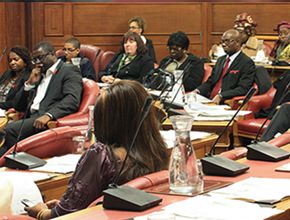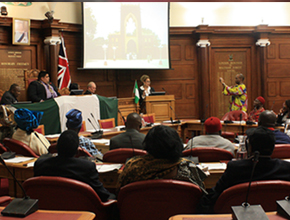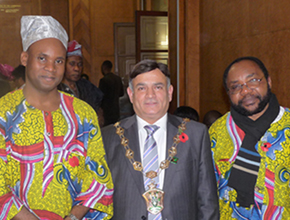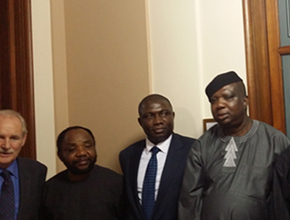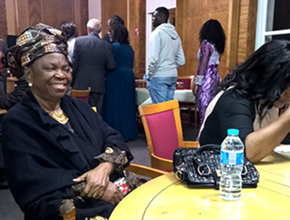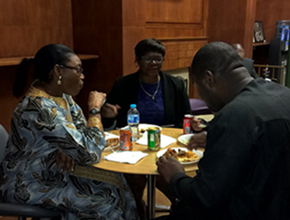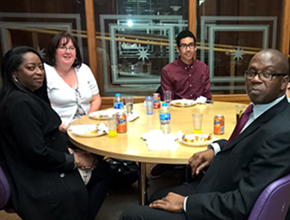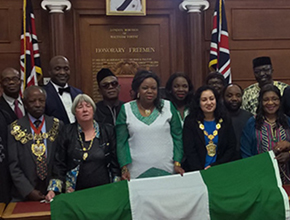A Brief History Of West Africa
The exploration of the place now called Nigeria began in 520 BC by the Phoenicians laid by Hanno and in 1400s by Portugal and Spain. Britain came into it in 1851 as mentioned below. It should be remembered that it was a stage play and Nigeria plays as designed for convince and merchantable objectives. Until 1884, Igbo was one unit with Cameroon. In 1885, the West Afrikan Berlin Conference (1885) caused division. In the same year, Britain retained territorial kontrol over the north mainly the Bornu-Kanem Empire with its main cosmopolitans in Kwandu (Bornu) and Sokoto. German took Cameroon, which it surrendered to France in 1919 as reparation of the WW1. Britain kept Igbo side under the control of the foreign office and exploited by the business groups of the Royal Niger company until 1892
when it was bought out with £1m and transferred to the colonial office. The British had maintained a territorial command of Lagos since 18511 and made peace in England in 18572. Britain annexed Lagos in 1861 to fight against the slave trade. The political konquest of these people started in 1885 with the case of Kosoko and Akintoye; next was the konquest of Edo (Bight of Benin) in 1897. With this Yoruba (west) and Benin former Bight forged into one in 19064. The Igbo having requested direct rule from Her Majesty Queen Victoria in 1896 refused indirect rules that have applied to the northern Emirs and caliphates. This led to the Aba Women Riot of 1927-19325. Then, there were the western, Oil River or Niger coast alas Bight of Biafra and northern protectorates. Between 1906 and 1908, the British forged the west, Benin and Biafra into what was known as the southern protectorate.
This was the spring board for the proposals of 19116 for the amalgamation of the northern and southern protectorates. The Amalgamation Proposals with reasons of four regions with the federal capital suggested at Mt Parte (Abuja)7. No reason was given except the WW1 for the implementation of the unintended on 1 January 19148. After the WW1, Nigeria was on secondment with no mind of its own until after the WW11. The politics of north and south was imposed and there was no consensus at any point. Remarkably, when people who used to live covenantally live without it, widens the scope of expectations and surprises.
That the people pretended what they are not materialised stage by stage from 1945. What does a trader know of constitution? The pace was rapid even when the north objected Chief A Enaharo's motion for self-govern in 1953 for 1956 served a good lesson to review approaches. The negotiations were psychedelic and undermining according to what E.D Morel described as half-educated elites, who assumed knowledge but failed the psychology test of true solution. It back fired in 1960, when the election result was announced before the count and national census forged10 to expedite such false result. What happened called for review but Nigeria went on for Republican status in 1963, i.e., has achieved full independence. The unable to walk but easy to limp stalled in the 1964 elections, which finished well in the east butprotracted to the November 1965 in the north and west. In Nzeogwu1, Obasanjo described what happened that led to the first military coup by Nigerian army on 15 Jan 1966. Since 1966, there have been six coups and two attempted. It is over 40 years of the war (1967-70) but killing the Igbos or southerners for any reason (race or religion) kontinues up to 2011.
This calls for inquiry in this decade or millennium on how best to re-arrange Nigerian kommunities to ensure terms and conditions to live together. No communities in Nigeria can transplant another but terms and conditions must be discussed, negotiated and agreed to enable the development of Nigeria for every Nigerian. The situation in Nigeria is hurting the Igbos who believe that they can live anywhere and forge good neighbourhood. This is only interest of a few and not restrictive of any other constructive alternatives. The in-fighting in Nigeria is a great temptation for people naturally positioned to appreciate each other. The Nigerian situation has not changed T. Balewa's views of 19472 and A Bello's statement in the General Conference at Ibadan (1950)3. Nigerians cannot be matured on paper independence without keen interest in understanding and perceiving the odour of their neighbours' mouth. Things have continued analogously and what Boko Haram and his team are expressing require careful consideration. You can take the horse to the waterside but not force it to drink. Boko Haram operates in politically controlled region; it will be a mistake to assume that he is alone or empty of agenda. Nigeria has taken enough blood; moreover, if we have matured, we should consider his reasons and seek for solutions most acceptable to his/our community. If a part does not want Western Education, it can not be forced but allowed to practise what it wants while those who want Western education are allowed to assess themselves on it. How kan we live peacefully is the point? How ever it is achieved to strengthen neighbours should be konsidered. At the turn of the 21st century, it is no longer nationalism but the terms and conditions to live peacefully because everyone singly or collectively has his life to live. That we meet or are brought together by foreigners is no longer a viable path. It has destroyed our value system, respect and progressive admiration of each other; yet, the kin and kits battles are yet aside. A new era is born, what is Nigeria about or offering its citizens? If we belong and labour together, when the apples ripe, they must go round or shall we look elsewhere for something we should get at home? Oh where does our relatedness begin, work and/or end? One Nigeria! One People! One Fate; is the task theorem or practice? Nigerians are still among the best people in the world but their administrative arrangements easily betray them. As A Balewa stressed in 1947, it is a mark of foolery to try to kover up pregnancy. Hausa has not changed to become Igbo, nor have the other parts changed to become Hausa or Yoruba but the administrative koncern is to organise each to enable maximum kontributions. The nation so far misplaced its priorities, which easily produce nonchalant results. The goodwill between the governors and the governed, where is it? A day to remember is a day to review for better collectivism, where are we? How best can we restructure to get the best for and from its citizens?
Slave Trade And Colonialism:
As the Portuguese and Spanish came with the European style, they changed Elmina to Gold Coast in 1484, in 1486, they changed Eko to Lagos; in 1488, they changed Edo to Benin and in 1497, they changed Igbo to Biafra and soon these coastal communities became Kingdoms. What was intent in the above was formatting likeable names to their memories because along these coasts, slave trade had begun since 1441 through the trans-Saharan trade route. The Europeans joining in this trade echoed it loud. The above sea coast operations worked until 1516 when Britain joined in the trade but left it in 1847, when the Yankees (America) joined. Thence Britain began to pass prohibition law to outlaw slave trade. In practical action this led to the formation of the West African Frontier Forces, mobilisation of ex-slave. They moved from Liberia and Sierra Alone to Gold Coast and to Lagos in 1851. After Consul Brand's report, Lagos was annexed in1861 as a secure base to fight slave trade. It was in this sense that Kosoko and Akintoye differed and Kosoko was deported and Prince Akintoye ruled under the dictates of Britain.
In cutting off the routes of supply, the misunderstanding at Egbaland was quenched by British forces in 1857. Unknown of the degree of mission, Oba Ovemrami in trying to support his kiths and kin (Yoruba), he hired the Igbo Mercenaries who quartered at Onyeigbo and fought at Iddo; what were they fighting? They were fighting the WAFF and for what? It was to continue the slave trade. The war nevertheless moved to Benin where Oba ovemrami fought a protracted war and was eventually overtaken in 1897. With Oil River now the only supplying coast, the battle reached them in 1887 when Onitsha was shelled on the eve of Christmas. The war raged between dealers i.e., members of the Royal Niger Company and abolitionists. In 1899, Britain negotiated a deal with the Royal Niger Company for £1m and took over the affairs in this area. It was a moving battle and the British won in 1901 with the conquest of Aro-Chiukwu and taking away their Ubinukpabi. Both Adam and Bryan Edward, owners of plantations in the West Indies gave detailed accounts and stated that Igbo contributed 80 per cent of the slaves from West Africa. 80 per cent on the upper limit of what happened when the Yankees joined in 1847 totalled about 31 millions Igbos scattered over West Indies, New Foundland, etc. If one stole a sheep or cut his brother hand, the mark is there indelibly but they are still brothers. If they live, equity requires them to discuss, negotiate and reconcile otherwise they live with their faults and anguish in its grief. So as a mistake that did not end in death is lesson for the living, reconciliation is imperative.
Biafra War:
When something that has not happened before occurred, we remark it for history because history picks every event. Kolonialism aside, do you believe that there would have been such a war if the sections of Nigeria (Igbo, Edo, Yoruba, Tiv and Hausa) had discussed, negotiated and agreed on terms and conditions to live together? More so, would they have kome together without the foreign agenda? What konfidence was in it for people brought together by and for foreign agenda? After the slave trade, Britain mobilised the mercenaries and trained them to become the artisans for railways from Lagos to Kano and Port Harcourt to Kano.
This was how the Igbos got involved and entangled in Nigeria by working hard and following Britain wherewithal. With the railways running, employment gained but politically the entity Nigeria was not agreeing. After the elections of 1964 that ended in the North and West in November 1965, Obasanjo then, an Army Engineer told us the mood of the soldiers, which was north for north, east for east and west for west, and then what happened? The Military youths planned coup and key staged it thus, Eastern soldiers for north, Northern Soldiers for West and Western Soldiers for East, for what purpose? What was in their mind; is killing the best way to resolve problems; who will benefit from blood? It was to kill the leaders but killing was already forbidden from the days of Kaine and Lemechi. Who gave monkey gun destroyed him. In the East, the Western soldiers stumbled and failed in their execution of not ably killing even a leader. In the West, the northern soldiers killed Akintola and in Benin, Oketi Ebu and in the North, the Eastern soldiers killed Abubakar and Ahmadu Bello.
On the turnaround, those that executed the plan were blamed and this fuelled the fire of indiscriminate killing of easterners in the north. The subsequent appointment of General Ironsi as Head of State and Commander-in-Chief of the Nigerian Armed Forces fuelled further fire of Eastern domination. In spite of Ironsi setting up a Panel to investigate the coup of 15/01/66, chaired by a British Judge, the report submitted was never disclosed but that Ironsi must die and he died with the Unitary System with a friend FajuIyi on the 29 July 1966. Subsequently, Col. Gowon came back from Sandhurst and became the Head of Head and Commander of the Armed forces. With a Northern Christian in power, the problem should be resolved but upon the two coups, fear raged to raise issue of structure to enable Nigeria move. On his first announcement to his candid nature Gowon said that there is no basis for Nigerian Unity. He was supported by Francis Cumming-Bruce to alter further, however……. The latter led to committee meetings of the Supreme Military Council, which led to Conference in Ghanaian city called Aburi, where matters seemed settled but back home the decisions were pushed aside. During this stage of it, state creation was suggested which the northern delegates threatened with cessation if accepted. Then, confederation or devolution of power to the regions was tabled and nearing conclusion, Col. U Kastina flew from the North and after a meeting with the Northern delegates; they came back and fixed their guns for state creation. The Eastern delegates refused for the fact the northern delegates rejected it before.
This disagreement on 25 February 1967 was what caused the war (1967-1970) and in 1997 the UK government implemented what Harold Wilson (PM) refused in Nigeria in 1967. Taking stock, Hausa, Tiv, Igbo, Benin and Yoruba have existed before the foreign intrusion into their affairs; kan they deny knowledge of each other and how they lived? Is Edo Igbo, Yoruba, Tiv or Hausa, vice versa? How best can Nigeria be restructured to tap and absorb the local knowledge and empower real development? It is not only Igbo case but jeneral systems' demand that the whole kannot achieve full result without any part and when the centre of the whole fails, the parts are in danger; thus, to strengthen the parts is to transfigure the whole. Kan Nigeria kreated on the eve of the WW1 kontinue as determined by Britain or should those waking up today, take thought to reinvent their workings? Konsider Nigeria since Enaharo's motion of 1953; konsider the lingering issues and reluctance of Nigerians to work together; then, you remember the Independence Konstitution which recognised empowerment from regions to the centre and indeed, hot soup are leaked from the edge. Top-down will at no time favour Nigerian development but grassroot or Localism process. The Bible says: love your neighbour as yourself and this is still the most difficult and complicated law even though religious people rush it. God is easier to understand because he is one, unique and incomparable but to make good and dependable neighbourhood, one needs to be specific with definitions, determinations and undertakings. Jesus' illustration of the Good Samaritan was very good in morally conscious world1 but not in a heterogeneous greed, unaccountable nation-state. A grassroot overhauling is that Igbo takes responsibility of safety and security of all lives in Igbo; on the way to Lagos, it hands over to Edo and Edo to Yoruba and similarly so on the way to Hausa via Tiv. Accountability, safety and security enhance trust and confidence.
Igbo was a part of the Regulum de Biafra named in 1497 included the Cameroon with its capital at Douala and divided by the colonialists in 1885 during the West African Berlin Conference into Eastern Biafra (Cameroon) and Western Biafra (Igbo). The Middle Belt (Tiv) anchors on the northern bank of the River Benue hailed from the Yukun Deltaic region of Rio del Ray. Then, there is the Hausa of the former Bornu-Kanem Empire, on the route of the trans-Saharan Trade, which became nomadic and Islamic through contacts with the Yehmen traders on the route to Senegal. Each empire or kingdom retained its customs and this is what made Nigeria an umbrella Organisation. The remaining West Afrikan states (Burkina Faso, Cape Verde, Cote d’ivoire, Gambia, Guinea, Guinea-Bissau, Mali, Liberia, Mauritania, Niger, Senegal, Sierra Leone and Togo) are traceable but our immediate concern is Igbo. From the above, one notices immediately that Cameroon is not a member of West Afrika and Igbo is simply for belonging to Nigeria.
Igbo is a name, race, custom, place and system of expression as anglicised to Heebo, Ibo, Eboe and Hackbous amongst foreigners. Genealogically, Igbo is traced to Lemechi and Ada (Genesis 4: 18-19). Igbo is the original home of the Bantu peoples of Afrika. History has it that the aborigines of India (Umu-Chima), Chino (now China), Umuchokwe in Namibia, UmuOvimbundu in Angola, UmuSwaziland, UmuZulu in South, etc, the Aborigines in Australia and Japan hailed from Igbo. Further, history has it that 80 per cent of the people removed from West Afrika during the slave trade (1441-1901) hailed from Igbo.
Igbo heritage is wide and tracing Igbo from sixth generation from Adam is very challenging, entertaining and inviting to spur settlement history of human race from Adam to the now seventh millennia from Adam. If we stopped wars, we take to learning to knowing and understanding the world including improving relationship with our neighbours and humanity generally. This is what we set out to achieve with the Institute. It will challenge us to ascertain certain hidden details associated with the age of Igbo. It will assist us in particular to participate in providing a pact to healthy and dependable Nigeria, where love and peace reign supreme.
